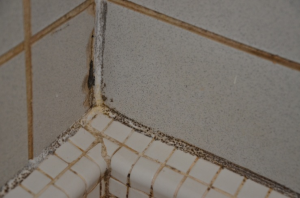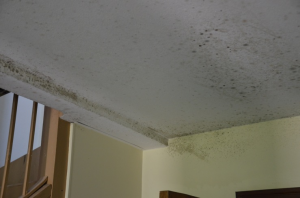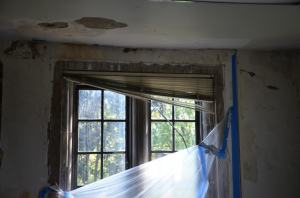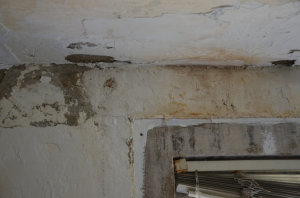How bad it really is
Showers are supposed to be hygienic, but what if students are being showered with more than just soap and water? According to freshman Giovanni Cannizzaro, his first floor Lohman Complex (SS) bathroom has been housing mold for the better part of the semester. 
“I’m trying to move off campus because it is so bad. I’ve met with Lindy [The Residence Hall Coordinator of SS], and apparently Residence Assistants have been complaining since the start of the year. It took until I went to them for them to scrape dead flies off a wall. They had to replace a show curtain that was stuck together from mold,” Cannizzaro said.
Cannizzaro has been suffering from a severe sinus infection this semester, and he believes that mold could be the cause.
“This hasn’t been officially diagnosed, but a clinic told me that prolonged exposure to mold can mimic a sinus infection, and I’ve been sick for two months. I went to the ER with a severe bloody nose, and the compound pharmacist said it could be due to mold. That was back in October. Every bathroom I’ve been in has mold, and I don’t see it getting better. The dorms are neglected. They say they put down a powder that kills the mold, but that it takes 10 minutes for it to work, and students take showers too frequently. I find it hard to believe they put down powder every day and it gets ruined by a shower,” Cannizzaro said.
Beth Anne Carman, the Director of Facilities Management, takes all claims about mold very seriously.
“The first thing we do is investigate. We determine the probable source. Is it due to humidity, an exhaust fan, leaks, environmental issues, or something else? Then we determine the potential health risks and the amount of effort it will take to clean it. There are many, many, many types of mold, some worse than others.
When it comes to showers, it can come from being a humid environment and outside air flowing in. But is it just on the surface, or is it behind the walls? Typical bathroom mold is capable of being cleaned by our staff. If we are capable of doing in house cleaning, we do; if not, we bring in a contractor,” Carman said.
According to Carman, just because mold has been cleaned doesn’t mean it looks like it is gone. “One of the most common issues is that when we clean [mold] ourselves, it stains. The walls are stained, and we have to paint. We could be left with that staining for a while, while we wait to paint at a time that is least inconvenient to the students. There is not always active growth,” Carman said.
Residence Halls are not the only buildings on campus to be struck with a mold issue. The Kerns Religious Life Center has had all of its offices moved to other locations on campus due in part to mold. Dr. Craig Burgdoff, the Religion and Philosophy Chair, had his office relocated from Kerns to Renner hall earlier this semester.
“About two weeks before the semester began [my office was moved]. It was very difficult to get it done before classes started. [The reason for the move] was health concerns. We’ve been worried about Kerns for a while. When we came back from the summer, with the cleaning that was going on, it had gotten worse before it got better,” Burgdoff said.
It is unknown at this time how bad the situation in Kerns really is, but junior Eric Heuer did research on mold growth in academic buildings for his research methods class, and Kerns was one of the buildings he studied.
for his research methods class, and Kerns was one of the buildings he studied.
“The temperature and humidity of different buildings affects the amount of mold growth in air ducts. We tested every classroom in Kerns, Renner, Huber Spielman, Battelle, Ruff, the Library, and the Capital Center. We would choose a specific air vent, place a dish on it for 10 minutes, remove it, incubate it, and see the growth. The Kerns plate was completely covered. It had disgusting mold growth after 48 hours with seven types of mold. The Renner plates are almost as bad. Some buildings only had a few growths. The older the building, the worse the growth is,” Heuer said.
The research methods study did not focus on types of mold. It also did not focus onresidence halls because “there would be too many
variables to take into account,” Heuer said.
Mold was not the only factor in the Kerns offices being relocated. “Part of the testing we conducted determined that not just mold was in Kerns, but mortar dust from the renovations that were going on. Over time, the mortar between bricks erodes. They had to drill it out, and air infiltration points, like windows or the bricks themselves, let dust into the building. It affects the air quality. A majority of the complaints were due to dust,” Carman said.
Despite the offices moving, classes were still held in Kearns this semester. “We’ve had all the classrooms tested, and there were only a couple of areas that were a concern, and we are addressing those,” Carman said.
Burgdoff added more information. “We haven’t heard about moving back [into Kerns]. They have to get contractors and consultants.

“As far as I know, Campus Ministry events and worship will continue in Kerns in the spring semester,” Campus Pastor Amy Oehlschlaeger said. for that long.”Capital tests for mold semi-annually. “We watch for areas that we know are problems. If it becomes a cause for concern, we call in
 additional testing. We always ere on safety and follow recommendations from independent third party consultants. We’re very committed to maintaining the environment,” Carman said.
additional testing. We always ere on safety and follow recommendations from independent third party consultants. We’re very committed to maintaining the environment,” Carman said.
Director of media relations and communications for Capital, Nichole Johnson, said that “Testing has been done for a long time. This is not new. We’re always looking to improve Capital’s infrastructure.”
Facilities Management says they are compliant with all American Society of Heating, Refrigerating and Air-Conditioning Engineers (ASHRAE) and Occupational Safety and Health Administration (OSHA) standards when it comes to mold.
Despite the reassurance, students still question the cleaning of the mold.
“I’m curious to see if there is mold in the walls. Mold goes away, but how long before it comes back?” Cannizzaro said.
Any student who thinks they have mold in their room or bathrooms can file a work order through their RA or online at http://www.capital.edu/facilities-management.

